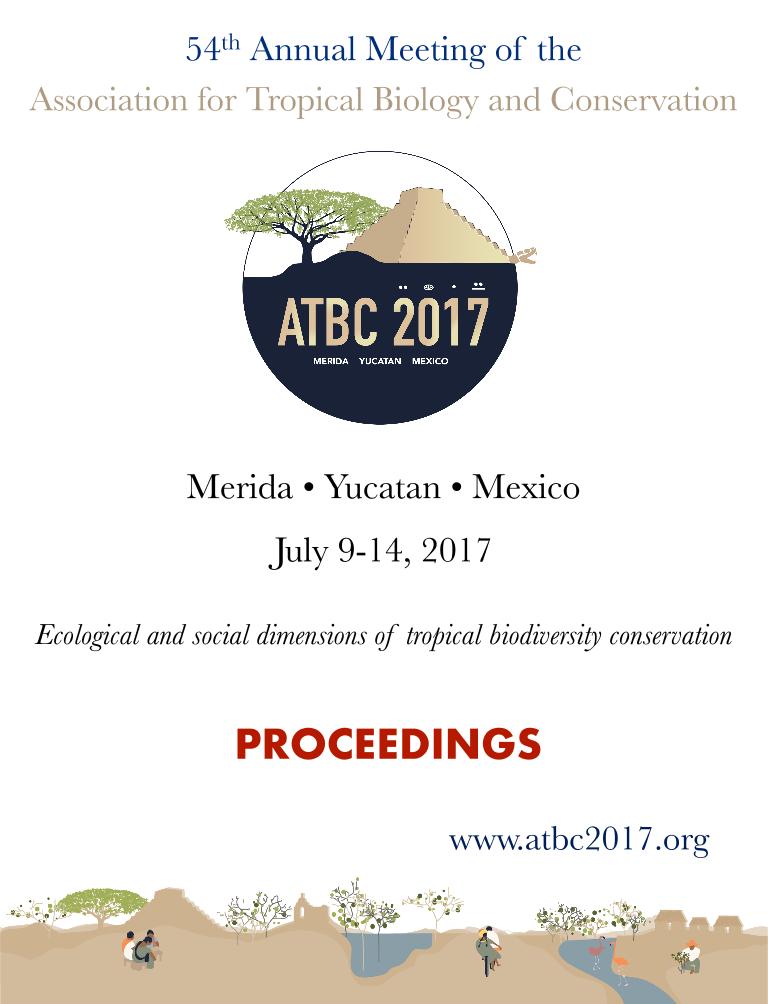Mostrar el registro sencillo del ítem
dc.contributor.author
Aguilar, Ramiro

dc.contributor.author
Carbone, Lucas Manuel

dc.contributor.author
Ramello, Pablo José

dc.contributor.author
Ashworth, Lorena

dc.date.available
2023-12-11T14:32:13Z
dc.date.issued
2017
dc.identifier.citation
Anthropic effects on pollinators in the southernmost limits of subtropical dry forests; 54th Annual Meeting of the Association for Tropical Biology and Conservation: Ecological and social dimensions of tropical biodiversity conservation; Mérida; México; 2017; 71-71
dc.identifier.uri
http://hdl.handle.net/11336/219791
dc.description.abstract
Human activities are dominant drivers of current biodiversity changes throughout the world. Land use practices such as deforestation, grazing, and agriculture affect ecosystem structure and functioning and regional climate. The southern most limits of subtropical dry forests have experienced the highest rates of deforestation worldwide over the past decades, and such landscape changes can alter plant-pollinator interactions in different ways. Animal pollinators are responsible for the sexual reproduction of 80% of angiosperms and also play a key role in fruit/seed production of domesticated species and in the reproduction of many useful wild species. Due to the essential ecosystem services provided by animal pollinators it is particularly important to learn about their dynamics in such changing environments. Here we assess pollinator richness and abundance in different anthropic scenarios: i) a gradient of habitat fragmentation landscapes, ii) unburned, high and low fire frequency sites, and iii) a gradient of agricultural intensification. Habitat fragmentation strongly reduced richness and abundance of Lepidoptera and Diptera and small solitary bees. More mobile pollinators such as hummingbirds, Bombus spp. however, showed no changes. Apis mellifera, showed an increased in relative abundance in smaller habitat fragments. Fire frequency also elicited species-specific responses of pollinators. Bombus spp. were equally abundant across sites whereas other pollinators such as Megachile sp., Notanthidium sp., Trimeria sp. were either reduced in abundance or absent. We discuss the implications of these findings for the reproduction of native plants species in ubiquitous human-altered landscapes.
dc.format
application/pdf
dc.language.iso
eng
dc.publisher
Association for Tropical Biology and Conservation
dc.rights
info:eu-repo/semantics/openAccess
dc.rights.uri
https://creativecommons.org/licenses/by-nc-sa/2.5/ar/
dc.subject
Native pollinators
dc.subject
Animal pollination
dc.subject.classification
Ecología

dc.subject.classification
Ciencias Biológicas

dc.subject.classification
CIENCIAS NATURALES Y EXACTAS

dc.title
Anthropic effects on pollinators in the southernmost limits of subtropical dry forests
dc.type
info:eu-repo/semantics/publishedVersion
dc.type
info:eu-repo/semantics/conferenceObject
dc.type
info:ar-repo/semantics/documento de conferencia
dc.date.updated
2023-01-31T12:30:14Z
dc.journal.pagination
71-71
dc.journal.pais
México

dc.journal.ciudad
Merida
dc.description.fil
Fil: Aguilar, Ramiro. Consejo Nacional de Investigaciones Científicas y Técnicas. Centro Científico Tecnológico Conicet - Córdoba. Instituto Multidisciplinario de Biología Vegetal. Universidad Nacional de Córdoba. Facultad de Ciencias Exactas Físicas y Naturales. Instituto Multidisciplinario de Biología Vegetal; Argentina
dc.description.fil
Fil: Carbone, Lucas Manuel. Consejo Nacional de Investigaciones Científicas y Técnicas. Centro Científico Tecnológico Conicet - Córdoba. Instituto Multidisciplinario de Biología Vegetal. Universidad Nacional de Córdoba. Facultad de Ciencias Exactas Físicas y Naturales. Instituto Multidisciplinario de Biología Vegetal; Argentina
dc.description.fil
Fil: Ramello, Pablo José. Consejo Nacional de Investigaciones Científicas y Técnicas; Argentina. Universidad Nacional de la Plata. Facultad de Cs.naturales y Museo. Cátedra de Zoología de Invertebrados I; Argentina
dc.description.fil
Fil: Ashworth, Lorena. Consejo Nacional de Investigaciones Científicas y Técnicas. Centro Científico Tecnológico Conicet - Córdoba. Instituto Multidisciplinario de Biología Vegetal. Universidad Nacional de Córdoba. Facultad de Ciencias Exactas Físicas y Naturales. Instituto Multidisciplinario de Biología Vegetal; Argentina
dc.relation.alternativeid
info:eu-repo/semantics/altIdentifier/url/https://tropicalbiology.org/wp-content/uploads/2017/09/ATBC-meeting-2017-Proceedings.pdf
dc.conicet.rol
Autor

dc.conicet.rol
Autor

dc.conicet.rol
Autor

dc.conicet.rol
Autor

dc.coverage
Internacional
dc.type.subtype
Encuentro
dc.description.nombreEvento
54th Annual Meeting of the Association for Tropical Biology and Conservation: Ecological and social dimensions of tropical biodiversity conservation
dc.date.evento
2017-07-09
dc.description.ciudadEvento
Mérida
dc.description.paisEvento
México

dc.type.publicacion
Book
dc.description.institucionOrganizadora
Association for Tropical Biology and Conservation
dc.source.libro
Proceedings: 54th Annual Meeting of the Association for Tropical Biology and Conservation
dc.date.eventoHasta
2017-07-14
dc.type
Encuentro
Archivos asociados
